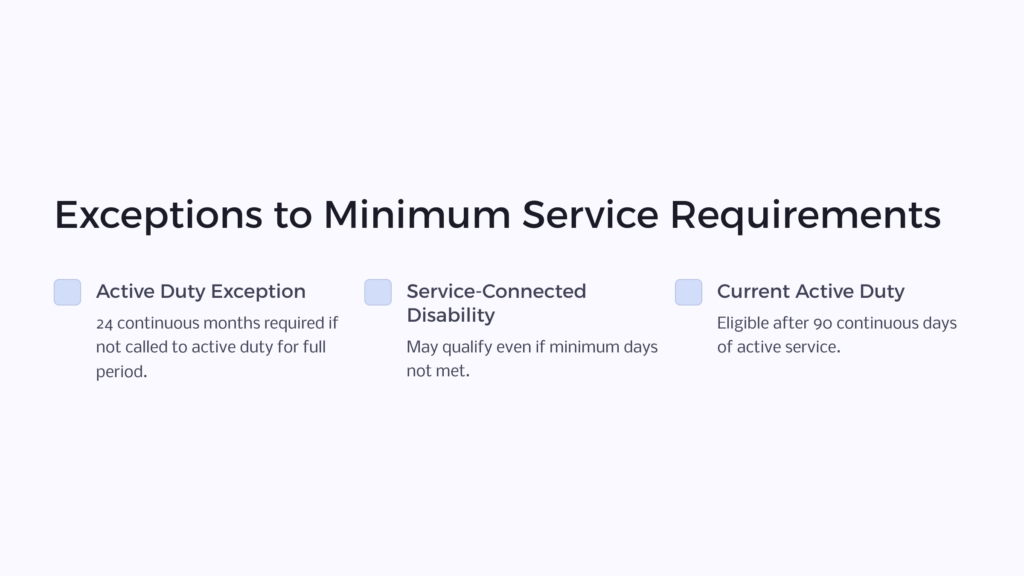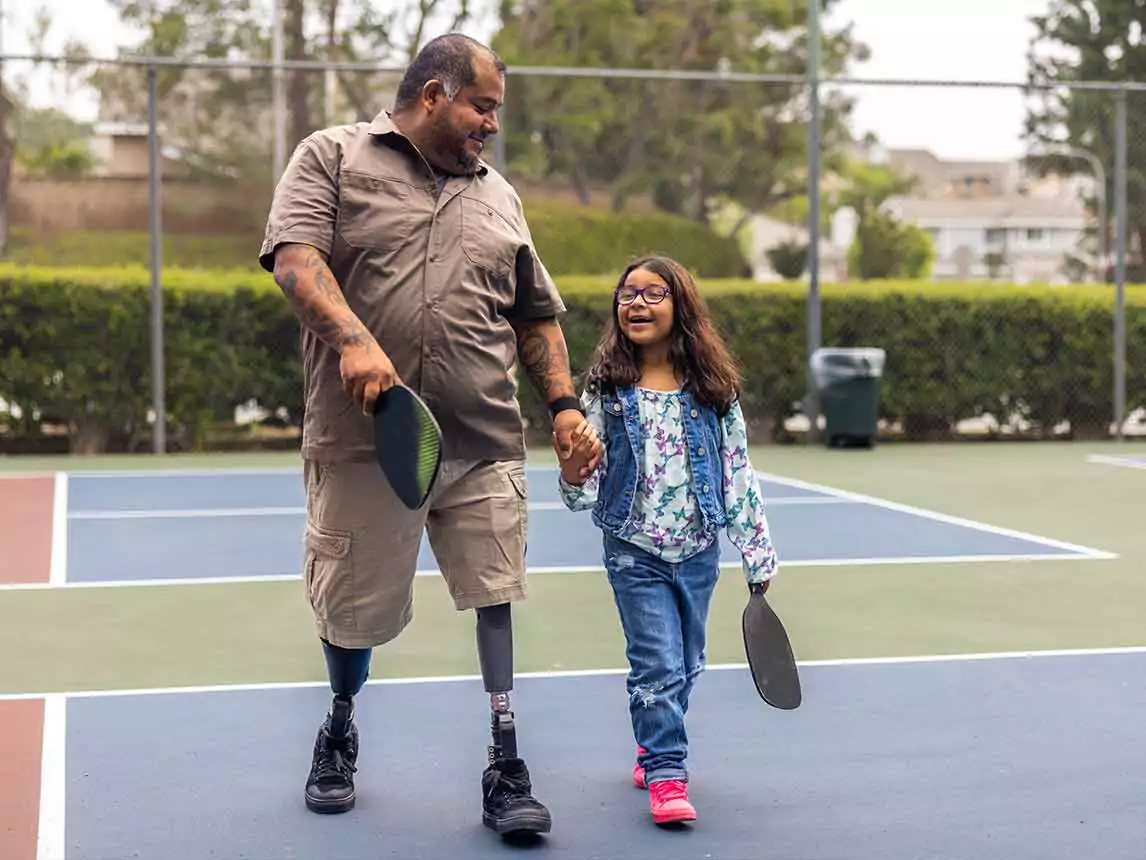VA home loan programs provide an excellent VA benefit to those current and former service members who meet the eligibility requirements. The potential benefits of VA loan options for the borrower are highly attractive compared to a conventional loan. These VA loan benefits can include no down payment, no private mortgage insurance, lower interest rates, lower monthly payments, and the potential for exemption from VA funding fees and closing costs.
What Are the VA Home Loan Requirements?
- 90 Consecutive Days During Wartime
- 181 Days During Peacetime
- Active Duty and Service-Connected Disability Requirements
- 6 Years in the National Guard or Reserves
- Honorable Discharge
- Surviving Spouses Requirement
The eligibility requirements for VA home loans depend on a variety of factors regarding your previous or current military service. These factors include your service branch and type (for example, did you serve in the US Army or National Guard? Was it active or inactive duty?), your service duration, and the time period in which you served, among other factors.
The specifications determining a veteran’s eligibility for a VA loan revolve around the amount of time served, whether it was active or inactive duty, and the time period (or era) in which you served. For veterans and current servicemembers, the minimum service requirement for time served primarily depends on two key factors: wartime vs peacetime and whether you served as an officer. In order to determine your eligibility for a VA loan, consider the specifications and dates surrounding each of the minimum requirements.
After you have researched your eligibility, you need to obtain a VA Certificate of Eligibility (COE) to prove your eligibility for VA home loan benefits to a VA mortgage lender. From there, VA home loan borrowers must complete a mortgage application process, assessing factors such as income, credit score, and current debt. Meeting the various VA loan qualifications could save a potential borrower from the costs of a down payment and mortgage insurance, among the multitude of other benefits of a VA mortgage.

90 Consecutive Days During Wartime
The minimum amount of time served to be eligible for a VA loan depends greatly on the time period in which you served. Specific dates define various wartimes. These dates will determine whether your minimum service requirement is 90 or 181 days. The following dates of service qualify you for eligibility after 90 days of service:
- WWII – September 16, 1940-July 25, 1947
- Korean War – June 27, 1950-January 31, 1955
- Vietnam War – August 5, 1964-May 7, 1975 (These dates extend to February 28, 1961-May 7, 1975 if your service was in the Republic of Vietnam)
- Gulf War – August 2, 1990-present, ONLY if you were called to active duty for the full 90 consecutive days during this period, or if you were discharged for reasons specified on the U.S. Department of Veterans Affairs website (If these additional specifications are not met, you must have served a continuous 24 months during this time period)
181 Days During Peacetime
Like the 90-day requirement, the 181-day requirement applies to veterans who served during specific dates. The following dates of service qualify you for VA loan eligibility after 181 continuous days of service:
- Post-WWII – July 26, 1947-June 26, 1950
- Post-Korean War – February 1, 1955-August 4, 1964
- Post-Vietnam War – May 8, 1975-September 7, 1980 (These dates extend to October 16, 1981 if you served as an officer.)
- September 8, 1980-August 1, 1990 (or October 17, 1981-August 1, 1990 if you served as an officer)
Active Duty and Service-Connected Disability Eligibility Requirements
For veterans, the minimum service days outlined above (90-days or 181-days) have two notable exceptions that affect the designated minimum service requirement. The first is related to active duty. Any service dates falling after September 8, 1980 have the added contingency that for the full period (the 90-day or 181-day period of continuous service), you must have been called to active duty. If not, the minimum requirement defaults to 24 continuous months.
The second exception impacting the minimum service requirements for veterans applies in cases where the service member has been discharged for a service-connected disability. In cases where this has occurred, the veteran may still be eligible for a VA loan, even if they have not met the minimum number of days of service. In this case, eligibility options should be discussed with either a knowledgeable VA approved mortgage lender or by contacting the U.S. Department of Veterans Affairs.
Finally, it is important to note that service members currently on active duty qualify for VA loan eligibility after 90 continuous days of active duty. While the requirements and contingencies surrounding the 90 or 181 days of service are very specific, the U.S. Department of Veterans Affairs outlines the dates and details clearly on their website.
6 Years in the National Guard or Reserves
The minimum eligibility requirements for current and former National Guard and Reserves members are more direct. Service members serving in the National Guard or Reserves during any time period must have served at least 6 years, and meet at least one of the following requirements:
- They were honorably discharged
- They were put on the retired list
- They were changed to Standby Reserve (as opposed to Selected Reserve) after honorable service
- They are currently serving in the Selected Reserve
Reserve or National Guard service members also qualify for eligibility if they served 90 days of continuous active duty between August 2, 1990 and the present.
Honorable Discharge Requirements
An honorable discharge is perhaps one of the most significant requirements to note, as it applies across all other eligibility requirements. Regardless of the number of days a veteran or former service member has served (whether on active duty or not), they must have been honorably discharged or still currently serving.
This status can be verified with a DD Form 214 (Certificate of Release or Discharge from Active Duty). Any discharge due to bad conduct or dishonorable discharge makes you ineligible for a VA loan. If you fall into this category, there still may be some options for you to explore, to change your status and become eligible. These options are included in the section below discussing situations in which one does not meet the minimum VA loan requirements.
Surviving Spouses Requirements

In many cases, the surviving spouses of veterans and service members are also eligible for a VA loan. For spouses of veterans and servicemembers to qualify as eligible for a VA loan benefit, at least one of the following must be true of the veteran spouse:
- They died while in service and you did not remarry
- They died as a result of a service-related disability and you did not remarry
- They died either in service, or as a result of a service-related disability, and you did not remarry before December 16, 2003 or before you were 57 years old (in some circumstances)
- They were completely disabled from a service-related disability and then died (even if the death was not directly caused by the disability)
- They are currently missing in action
- They are currently being held as a prisoner of war (POW)
In addition to meeting these requirements, surviving spouses are required to present additional VA forms and documentation when applying for their VA Certificate of Eligibility (COE). The specific forms required depend on whether or not the spouse is currently receiving Dependency and Indemnity Compensation (DIC) VA benefits or veterans disability benefits. The specific additional forms and required documentation are outlined on the U.S. Department of Veterans Affairs website and must be submitted along with the veteran’s DD Form 214 for the spouse to apply for a Certificate of Eligibility (COE).
Because surviving spouse requirements are particularly specific, you should discuss your potential VA loan eligibility with a lender or by contacting the U.S. Department of Veterans Affairs.
What If I Don’t Meet the Minimum Requirements?

There are certain circumstances in which veterans and former service members may still be eligible to qualify for VA benefits and apply for a VA home loan, even though they have not met the minimum VA loan requirements. These exceptions are related to the circumstances surrounding the individual’s discharge from service. Exceptions to the minimum eligibility requirements may be made in the following discharge situations:
- Discharge due to hardship
- Discharge at the convenience of the government when the veteran has served at least 20 months out of a two-year enlistment
- Early out discharge when the veteran has served 21 months of a two-year enlistment
- Discharge due to reduction in force
- Discharge due to certain medical conditions
- Discharge due to a service-connected disability (as discussed above)
In cases of bad conduct or dishonorable discharge, there may be opportunities to apply to have your discharge status upgraded. This involves a VA character of discharge review process followed by an application for upgrade. If you are successful in having your application approved and your discharge status upgraded, you may be eligible for a VA home loan and should apply for a VA Certificate of Eligibility (COE).
Finally, there are additional situations and extenuating circumstances in which one might qualify for eligibility for a VA home loan. Some of these extenuating circumstances that could lead to VA loan eligibility include service in various organizations, such as the Public Health Service, the United States Military, Air Force, Coast Guard, or Naval Academies, the National Oceanic and Atmospheric Administration, and various services during WWII. If any of these circumstances may apply to you, seek more information from the U.S. Department of Veterans Affairs or a VA approved lender to learn more about your specific VA loan eligibility.
Other VA Home Loan Requirements

Meeting the minimum eligibility requirements is only the first step in assessing your ability to take out a VA home loan. If you think you meet the VA loan requirements, your first action is to apply for a VA Certificate of Eligibility (COE). This can be done online, through the mail (using VA Form 26-1880), or through a VA lender (such as a VA approved mortgage company).
The COE determines and provides proof of your VA loan eligibility and an assessment of your loan entitlement, your VA loan limit, and VA funding fee exemption status. This VA certification provides the VA approved lender (often a private lender or loan officer) with the necessary information to begin your VA loan approval process. The VA Certificate of Eligibility also provides the lender with your VA entitlement code, your history of federal active service, down payment information, and other information necessary to approve you as a VA borrower.
After receiving the COE, the mortgage lender can assess your ability to meet other loan qualifying requirements and influencing factors. A VA borrower must still meet many of the same requirements as for a conventional loan, or conventional mortgage. These mortgage requirements include an assessment of your credit score, your income, your current amount of debt, and whether this will be your primary residence.
Just as is the case with a conventional loan, factors such as credit score and income will influence the borrower’s loan limit and interest rate. Based on the combination of the information on the VA Certificate of Eligibility and the borrower’s financial information, VA approved private lenders, loan officers, and credit unions will determine various loan options for the loan amount, interest rates, mortgage insurance, funding fees, and VA loan approval.
Understanding VA Home Loan Requirements
VA home loans are an excellent VA benefit available to veterans and current service members who meet the VA eligibility requirements. When considering all your loan options, a VA home loan is likely to provide the best option over a conventional loan. The minimum eligibility requirements for VA home loan benefits can be very specific and are applied differently, depending on various circumstances surrounding your individual history of military service.
The factors that determine your minimum eligibility requirements include the type and longevity of your time as a service member, the circumstances surrounding your current service or veteran discharge from service, and the time period in which you served, among others.
You can get started here with finding the right VA home loan for you! At Benefits.com, we are here to help you navigate the process and receive the benefits you deserve. Begin today by taking our free eligibility quiz.
 Benefits.com Advisors
Benefits.com Advisors
With expertise spanning local, state, and federal benefit programs, our team is dedicated to guiding individuals towards the perfect program tailored to their unique circumstances.
Rise to the top with Peak Benefits!
Join our Peak Benefits Newsletter for the latest news, resources, and offers on all things government benefits.



















